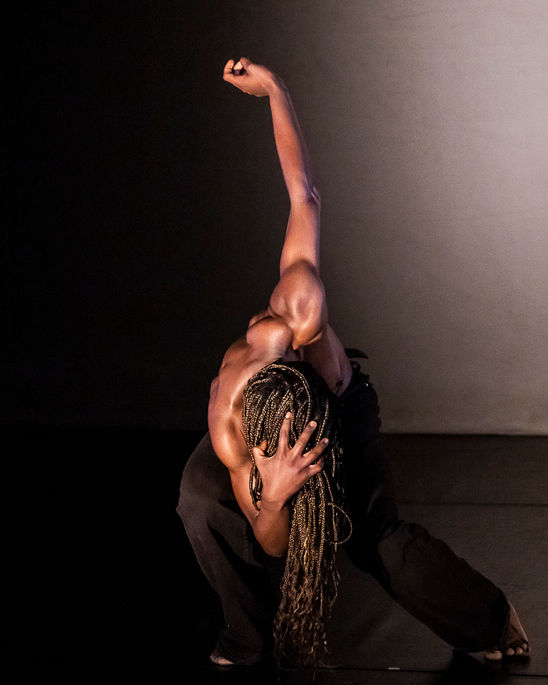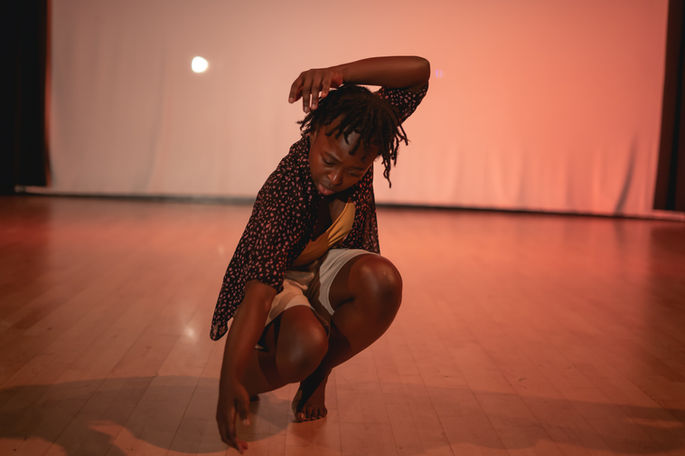
WAKATI
WAKATI
Wakati is a Swahili word for time. In this work, together with musician Stephan Meidell, the dancer Shelmith Øseth explores her own cultural background and the prejudices one carries along and encounters when moving between cultures. By using her experience of immigrating from Kenya to Norway, Shelmith examines expectations, ideas and limits that come along with being an immigrant and multicultural person in Norway.
The work sheds light on how identity changes and develops within a cultural context and between different cultures. Going beyond the personal Øseth shows how individual experiences are intertwined with social change and broader historical events. Art can offer a means of understanding the past and imagining the future.
Wakati premiered at Nordic Black Theatre with two showings at BIT Teatergarasjen Bergen. Wakati briefly toured in Edinburgh fringe.
Partners
Vibeke Flesland Havre, playwright and dramaturg
Stephan Meidell; musician and composer
Jan Holden; light technician
Producer: Camilla Svingen (Syv-Mil)
Olga Regitze; costume designer.
Carte Blanche: co - producer
BIT Teatergarasjen: co - producer
Fargespill: choreography adviser and help. as well as use of studio for rehearsals
Bergen Dansesenter: use of studio and helps with marketing Wakati
fundings: Kulturrådet, FFUK, Fond for lyd og bilde, Bergen Kommune.
more:
Artistic concept:
Wakati is a Swahili word for time. In Swahili it has a broad meaning and refers to the passage of time in big and small scales, and the effects that time has on individuals, cultures and identity. Wakati is an expression of and reflection on human relations towards each other within the context of time, and how time shapes us and our values. The notions, stigma and assumptions we have towards each other as people are perhaps the human things that are within us all.
The era we’re born into, the environment we grow up in and the teachings we gain along the way each of these affects the way we see other cultures and peoples. Time records our experiences with our families and values. Time provides context for these experiences and provides space for wisdom to accumulate. Time reflects the way we choose to treat our environment and our people. It shapes what we choose to define as ourselves.
As a black immigrant and artist, working in a predominantly culturally white environment, my belonging is often questioned. How I see/perceive myself in this context, how I meet/confront people's perception of me, not only paints a picture of who I am, but simultaneously affects how other black, immigrants are perceived.
The kind of surface assumptions and the pre-judgement we make of others are common in mostcultures. In Kenya it’s about one’s tribe. There are more than 40 tribal groups in Kenya. I belong to the “Luhya'' tribe. In Kenya, my tribe gives others an idea of who I am, my strengths, my weaknesses, my nature and my appearance. With each tribe there is a set of characteristics that you are automatically associated with, being a member of that specific tribe.
These identities are tied to the history of Kenya and its 40 tribes. But also to the historic relationship of colonialistic pressures brought by the west, for example The United Kingdom, upon african nations. Kenya has been changed by time and by its relationship to the west. And, my relationship with my blackness, my africanness and my humanness has changed as I have immigrated from Kenya as a Luhya child to a norwegian adult. | We hope and want to share Wakati with broader audience to open up more conversations within this theme but also for the sake of pure love for dance.
INTERVIEWS & REVIEWS:
SCENEKUNST REVIEW: https://scenekunst.no/artikler/kroppen-holder-regnskap
UNIVERSITAS REVIEW: https://www.universitas.no/aerlig-og-naert-om-en-viktig-historie/386411
DANSEINFO INTERVIEW: https://danseinfo.no/intervjuer/tid-identitet-og-kultur-som-sammenvevde-fenomener-et-mini-intervju-med-dansekunstner-shelmith-oseth/
























